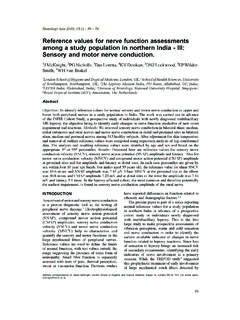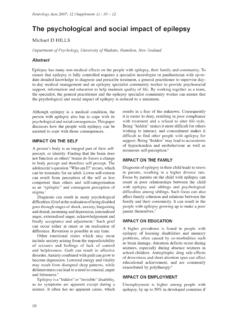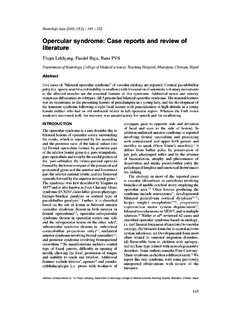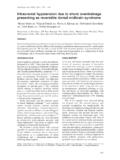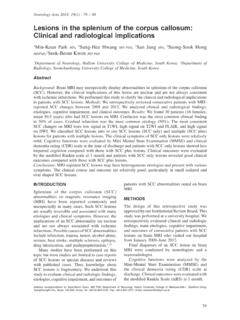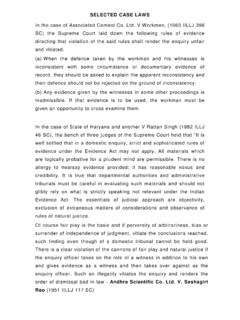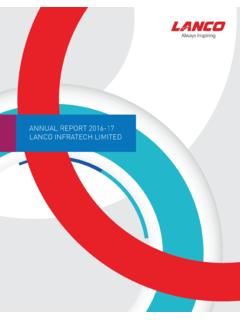Transcription of Epilepsy and discrimination in India - Neurology Asia
1 53 discrimination hurts and causes deep against persons with Epilepsy andignorance about the disorder exists is an overview of the problem experiencedin the is more pronounced when itcomes to socialization, marriage, employment,driving and disability rights. Reasons why peopledo not want to socialize with persons with epilepsyare many: seizures can be terrifying, a belief thatit is contagious, and spirit is most damaging when it comesfrom parents. When it comes from parents itmore likely takes the form of overprotectionrather than rejection.
2 Not understanding the long-term nature of Epilepsy , parents nurture a state ofdependence. The negative effects ofoverprotection become evident when the childturns into a young adult. Parents then startcomplaining about their child s behaviors andlack of independence. In both marriage andemployment, being open about one s Epilepsy isautomatically met with AND THE INDIAN LAWM arriageThe Hindu Marriage Act of 1955 and the SpecialMarriage Act of 1954 stated that a marriageunder these acts can be solemnized if at the timeof marriage neither party suffers from recurrentattacks of insanity or Epilepsy .
3 It took a struggleof 12 years for the Indian Epilepsy Association tohave the word Epilepsy deleted from this was achieved in December paradoxical lawsBarring employment to any person on the groundshe/she has Epilepsy would amount to violation ofthe Indian constitution. However the law alsosays that a State can prohibit employment ofpersons who are medically unfit if the nature ofthe job requires a fit person!InsuranceThe Life Insurance Company of India issues lifeinsurance policies at a slightly increased premiumrate of 10-15%.
4 However personal, accident,health and travel insurances are available with aproviso that the insurance does not cover illness/accident related to Epilepsy . Motor insurance andhome insurance are issued without any are also private companies who providelife insurance with or without extra premiumdepending on recommendations of a driving license applicants have to fill in aform which specifically asks Do you haveepilepsy? . If a person answers in the affirmative,he or she is denied a statusIn India , Epilepsy does not fall under the disability category.
5 We also do not have adisability discrimination , ATTITUDE AND PRACTICESTUDIESFour knowledge, attitude and practice studies1-4done in India reveal that knowledge of epilepsyamong the Indian population is high or comparableto western countries. However, attitudes towardsepilepsy are more negative. These attitudes havea significant correlation with level of educationand occupation, lower education is associatedwith higher ROLE OF THE INDIAN EPILEPSYASSOCIATIONFrom its inception in 1971, raising awareness andchanging attitudes has been the chief goal of theIndian Epilepsy Association.
6 As young minds areopen to thinking anew, school children form partof Indian Epilepsy Association s awarenessprogrammes. Other segments of the populationare educated through street plays, exhibitions,newspapers, radio and TV programmes. TheAssociation through its branches and chaptersoffers support services in the form of educationand information, counseling and personalityEpilepsy and discrimination in IndiaCarol D SOUZAI ndian Epilepsy AssociationNeurology Asia 2004; 9 (Supplement 1) : 53 54 Neurology Asia2004.
7 9 (Supplement 1)54development workshops, yoga, and are still many goals to meet and hurdlesto cross, which require the united efforts from theparents, persons with Epilepsy and the IndianEpilepsy Radhakrishnan K, Pandian JD, Santhoshkumar T, etal. Prevalence, knowledge, attitude, and practice ofepilepsy in Kerala, South India . Epilepsia 2000; 41 Gambhir SK, Kumar V, Singhi PD, Goel RC. Publicawareness, understanding and attitudes towardepilepsy. Indian J of Med Res 1995; 102: 34-83. Ray BK, Banerjee T, Ganguly G, et al.
8 Prevalence,knowledge, attitude and practice of Epilepsy in adefined community in West Bengal, India . The 4thAsian and Oceanian Epilepsy Congress, AbstractBook 2002: Seshadri V, Thomas J, Murthy JMK, Verma MA,Raju CR. Knowledge, attitude and practice ofepilepsy in rural Andhra Pradesh, South India . 4thJoint Annual Conference of the Indian EpilepsyAssociation & Indian Epilepsy Society, AbstractBook 2003: 4.
